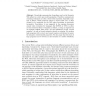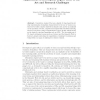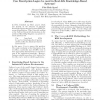1137 search results - page 55 / 228 » Knowledge Representation with Logic Programs |
163
click to vote
ASE
1998
15 years 2 months ago
1998
The process of understanding a source code in a high-level programming language involves complex computation. Given a piece of legacy code and a library of program plan templates, ...
145
click to vote
ECRTS
2002
IEEE
15 years 7 months ago
2002
IEEE
Most WCET analysis techniques only provide an upper bound on the worst case execution time as a constant value. However, it often appears that the execution time of a piece of cod...
149
Voted
ESWS
2006
Springer
15 years 6 months ago
2006
Springer
Knowledge representation formalisms used on the Semantic Web adhere to a strict open world assumption. Therefore, nonmonotonic reasoning techniques are often viewed with scepticism...
130
Voted
ICCS
2005
Springer
15 years 8 months ago
2005
Springer
Abstract. Description Logics (DLs) are a family of class based knowledge representation formalisms characterised by the use of various constructors to build complex classes from si...
118
click to vote
DLOG
1996
15 years 3 months ago
1996
In 1995, I nished my Ph.D. project which was focused on the selection of adequate Knowledge-Representation Systems (KRSs) for research applications. When I started working at the ...



